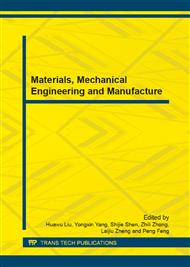p.1474
p.1478
p.1482
p.1490
p.1494
p.1499
p.1506
p.1510
p.1517
Research on Vacuum Consumable Arc Remelting Furnace Drop Testing System for Thyristor Power Supply
Abstract:
Stable and reliable automatic control system of Vacuum Consumable Arc Remelting (VAR) furnace with thyristor power supply is the key to smelt successfully special alloy metal and high temperature alloy metal, which is related to special properties of remelting ingot directly, however, it is key problem to test the drop pulse for thyristor supply. This paper makes a deep study for drop short pulse testing system on AVR with thyristor power supply, and digital signal processing is used to obtain drop short pulse value with different frequency ranges. According to the specification of thyristor power supply, firstly, basic theory analysis of drop short pulse measuring is researched. Secondly, high-speed digital signal processing technology is adopted to sample furnace voltage signal real-timely, trap filter group is designed to remove the multiple order harmonic, and band pass filter group is designed directly to process and calculate the amount of drop short pulses in different frequency ranges, finally, the material parameters which impact on drop short frequency. Field experiment results show the effectiveness of the whole drop short pulse testing system.
Info:
Periodical:
Pages:
1494-1498
Citation:
Online since:
December 2012
Authors:
Price:
Сopyright:
© 2013 Trans Tech Publications Ltd. All Rights Reserved
Share:
Citation:


